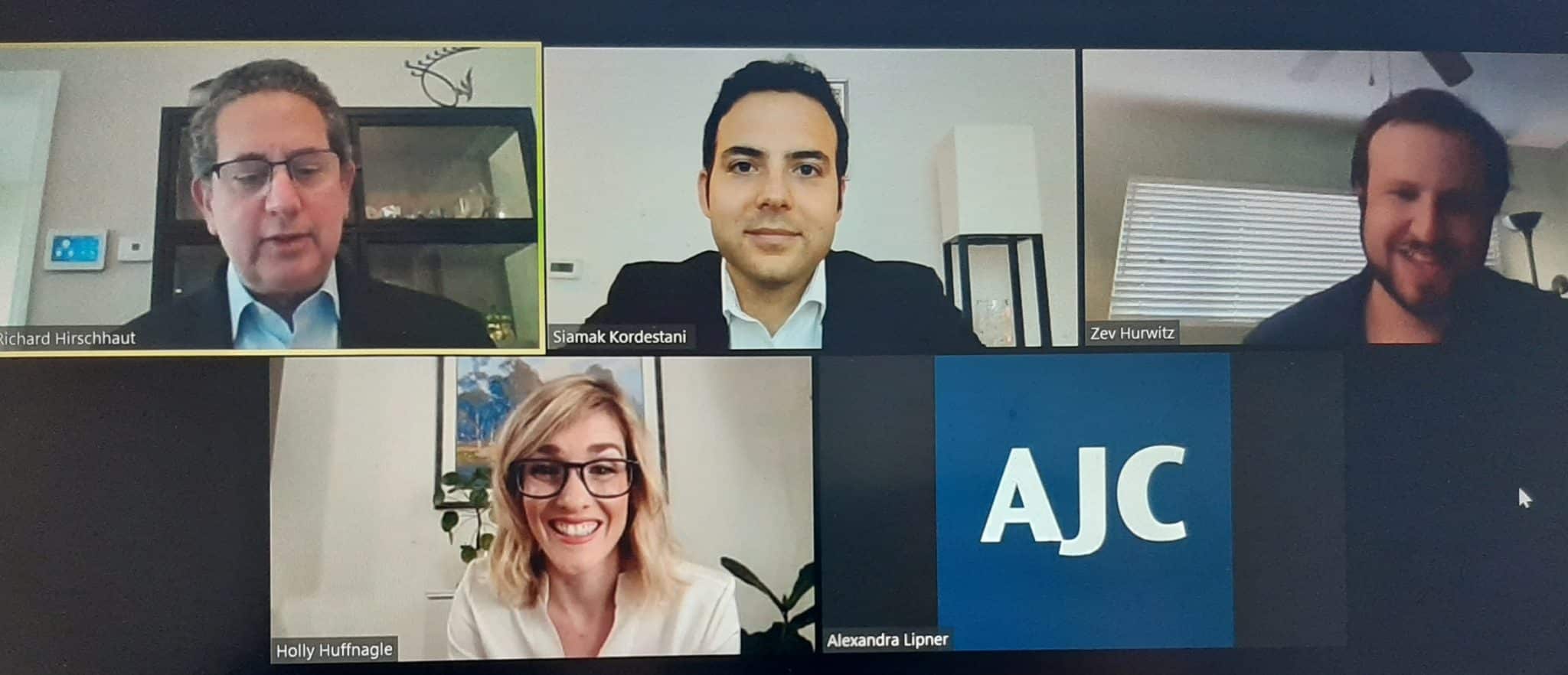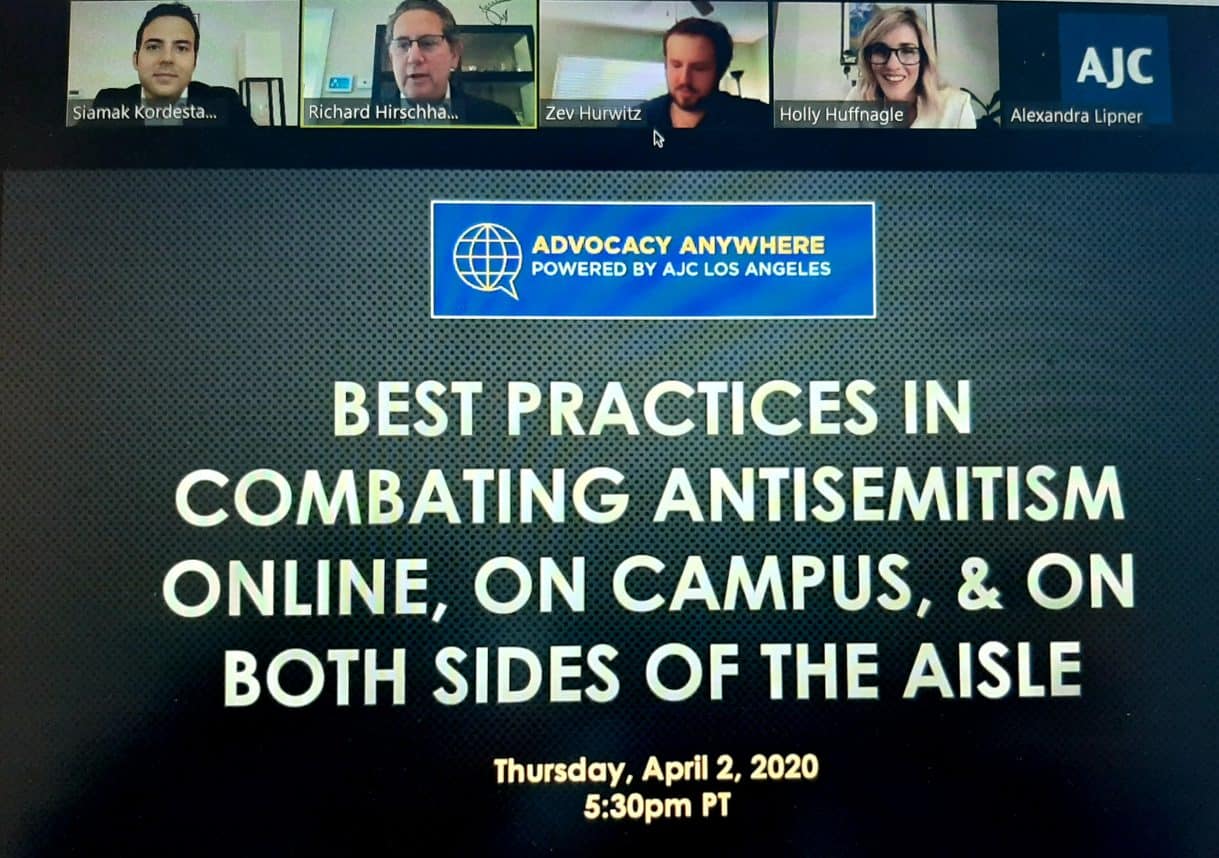 From left, AJC Los Angeles Director Rick Hirschhaut, AJC Los Angeles Assistant Director Siamak Kordestani, AJC Director of Campus Affairs Zev Hurwitz, and AJC Los Angeles Assistant Director Holly Huffnagle. Photo courtesy of American Jewish Committee.
From left, AJC Los Angeles Director Rick Hirschhaut, AJC Los Angeles Assistant Director Siamak Kordestani, AJC Director of Campus Affairs Zev Hurwitz, and AJC Los Angeles Assistant Director Holly Huffnagle. Photo courtesy of American Jewish Committee. The American Jewish Committee (AJC) held a Zoom call on April 2 to discuss how to fight anti-Semitism.
AJC Los Angeles Assistant Director Holly Huffnagle spoke about the latest trend in online anti-Semitism known as Zoombombing, where people disrupt a Zoom call with anti-Semitic material. She cited a March 24 Conejo Valley Unified School District board meeting that was Zoombombed with swastikas and pornography.
“Online anti-Semitism is increasing because of the coronavirus,” Huffnagle said, adding that “really the whole world is moving online.” She said there is a correlation between social media and anti-Semitic hate crimes, pointing to the Tree of Life synagogue shooter’s use of the far-right social media platform Gab and the shooters in El Paso, Chabad of Poway and Christchurch, New Zealand, being radicalized by the online forum 8chan.
“Assailants are often radicalized in these online environments to begin with, but they also use their social media networks to amplify their reach,” Huffnagle said, adding that anti-Semites like to promulgate their rhetoric online through memes and coded references like the media, globalists, Hollywood and East Coast bankers.
“It’s more subtle,” Huffnagle said. “It’s winking. It’s nudging; dog whistling, if you will.”
She also spoke of anti-Semites targeting Jews online through doxxing (revealing addresses and phone numbers), and pretending to be Jews online and saying things like, ‘I want to control the world.’ “We’re seeing this line between what’s real and what’s fake blurring,” Huffnagle said.
“Online anti-Semitism is increasing because of the coronavirus. Assailants are often radicalized in these online environments to begin with, but they also use their social media networks to amplify their reach.” — Holly Huffnagle
She went on to speak about disinformation and how it tends to spread quickly on social media platforms. She cited Facebook’s policy of running political ads without fact-checking them, as long as it gets paid. She also said 15% of Twitter accounts are bots that popularize disinformation.
Huffnagle called for tech companies to police their platforms and for users to respond to and report hateful online speech. “It’s really the role of individuals and civil society and tech companies working together to push back against online anti-Semitism,” she said.
AJC Director of Campus Affairs Zev Hurwitz discussed the boycott, divestment and sanctions (BDS) movement, which he described as anti-Zionist. “Not every adherent to BDS is an anti-Semite, but the underlying ideology … is rooted in anti-Semitism,” Hurwitz said, arguing that the movement calls for the destruction of Israel.
He spoke of how on college campuses, pro-BDS groups like Students for Justice in Palestine (SJP) launch campaigns pressuring the student government to pass resolutions calling on the school to divest from companies that conduct business with Israel. While BDS has been unsuccessful in getting universities to divest from such companies, the movement has created a hostile campus climate for Jewish students, Hurwitz said. “There is an attack on Jewish self-determination on campus,” he said, adding that “this is horrifically bigoted rhetoric that’s just allowed to exist on campus.”
Hurwitz also stated that 80% of students on college campuses are either uninterested in or don’t know much about the Israel-Palestinian conflict, meaning that the “80% stands to fall victim to misinformation and support for anti-Semitism.”

Jewish students also face anti-Semitism on college campuses in some progressive spaces that reject students because of their Zionist identity. These spaces view students who identify as Zionists as “white colonizers,” Hurwitz said, adding, “That’s a real problem that a lot of Jewish students are facing right now.”
Hurwitz acknowledged that the vast majority of Jewish students don’t feel unsafe on college campuses, and that positive stories on campus like Shabbat dinners and interfaith partnerships are overlooked because the BDS movement and swastika graffiti garner more headlines.
He encouraged Jewish students to form alliances with other minority groups on campus and to become acquainted with diversity and inclusion offices at their schools that can help when instances of anti-Semitism occur. “It just makes sense for the Jewish community to have the community support of other minority groups that are potentially subjected to discrimination of their own,” Hurwitz said.
AJC Los Angeles Assistant Director Siamak Kordestani said if anti-Semitism becomes a political cudgel, its meaning will be diluted and people will start tuning out the issue. “We run the risk that actual anti-Semitic rhetoric will be less noticeable,” he said. He added that anti-Semitism shouldn’t become a tool “to stifle criticism of a politician or a political party.”
Kordestani argued that social media has exacerbated a hyperpolarized political climate in America, since nuance is lost on social media and it’s easier to spread misinformation. “We have less of an attention span when it comes to conversations on the screen,” he said.
Therefore, he added, it’s imperative to maintain bipartisan support for Israel because anti-Zionism “has gained traction on the far left and that has contributed to the politicization about Israel.”
Kordestani encouraged people to urge their congressional representatives to join the Bipartisan Taskforce on Combating Anti-Semitism and to pass the National Opposition to Hate, Assault and Threats to Equality Act (NO HATE Act), which would provide grants to state and local governments to improve hate crime reporting as well as impose harsher penalties on those who commit these crimes.
“Those are two things that everyone on this call can be doing, to talk to their friends, their colleagues, their network all around the country,” Kordestani said, “and we can really get the needle moving on this issue through these two things.”























 More news and opinions than at a Shabbat dinner, right in your inbox.
More news and opinions than at a Shabbat dinner, right in your inbox.